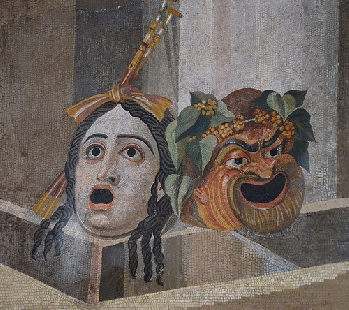
Mosaic depicting theatrical masks of Tragedy and Comedy, 2nd century AD, from Rome Thermae Decianae (?), Palazzo Nuovo, Capitoline Museums
(Image by Following Hadrian) Details DMCA
It's said that French humor is 'combative, fueled by ridicule and mockery and needs a target.' The weekly satiric Parisian newspaper "Charlie Hebdo" aimed at Islamic State, with consequences that suggest Islamic State does not understand self-deprecating satire. In sharp contrast, Western cultures and people generally pride themselves on finding something absurd to smile about in themselves.
Disconnects do occur. On a military exercise during the Cold War, our Norwegian NATO allies looked blankly when they discovered that a contingent of their British forces colleagues had attached the Norwegian Officers' Mess grand piano on an aircraft hanger outside wall. Sideways.
As a youth marinated in the 1950s, England imparted in me a solid, ineradicable sense of fun. Often dry, understated, subtle but life-enhancing. Humor is essential in a school where the headmaster explains that warm classrooms are unhealthy, and where his old army swagger stick is applied energetically and often, seam-side to.
England cornered humor as a defense against the weather. The country introduced the wonderfully smug Dogberry, Mrs. Malaprop's wildly inappropriate use of words, the wistfully sage Mr. Dick and his kite, Neddie Seagoon, Spike Milligan who knew the moon wasn't made of cheese but some sort of frappe. Out-of-control Basil Fawlty and pop-eyed Mr. Bean. Such as these rescue us from the deepest melancholy. If the best that America had to offer were the Three Stooges and the Marx Brothers along with that drippy Jerry Lewis with his spastic gyrations, I would probably never have applied for emigration.
My roots are German where humor seems to be less free-roaming or spontaneous. Groups have characteristics and humor of the self-mocking kind is not deeply etched in the national character, except perhaps in Berlin where cheeky irreverence is an urban art form.
Genuine World War II Wehrmacht joke.
Two Landsers(German Army GIs) are together in their foxhole looking at a world atlas. One of them sticks his finger on a spot on the map and says, "That's Germany." "No," his companion smiles, "that's the United States of America." The map holder puts his finger on the map a second time, "Oh, then this is Germany." His buddy replies, "No, that's Russia." Once more the soldier points at a place on the map and says, "This is Germany!" "Yes," his companion tells him, "That's Germany." The first soldier suddenly looks very thoughtful and asks, "Does Hitler know that?"
For Germans like me, born in the earlier years of the 20th century, even childish literature did not escape infusion of stern didactic utility. Gehà �rsamkeit(obedience) comes leagues before Là �cheln(smiles). Wilhelm Busch, inventor of the comic strip, and Heinrich Hoffmann Germany's classic writers of children's stories, set the tone for generations. Their popular tales for the very young push strict conformity laced with "Wipe that smile off your face!" Their tales are grimly moralistic and often end in death by fire, by scalding or frightful mutilation.
Beware, alcohol!
In Die fromme Helene, the emaciated little spinster Holy Helen likes her schnapps, accidentally knocks over a kerosene lamp and burns to a crisp. But that's not the end. German miscreants also get a metaphysical reckoning. Helen's guardian angel loses her soul to Satan. The story concludes when Busch shows us Helen tucked into a vat of fire everlasting. For tippling.
No Beatrix Potter in sight.
German parents of my parents' generation went for mockery and satire. The magazine Simplicissimus, or the character Kuttel Daddeldu. Dark stuff that bites. Der Hauptmann von KÃ �penick("The Captain from KÃ �penick") is based on the true story of a shoemaker in the old Kaiser's time who put on an officer's uniform and discovered that people immediately become obsequious, saluted smartly and obeyed orders, however preposterous. Encouraged by such mechanical deference the shoemaker commandeers a troop of clueless grenadiers who followed him to City Hall, which he takes over and loots. Without doubt, an allegory of Hitler's success. Put people in a uniform, slap on some epaulettes, and the German civilian population knuckles under at once. Or used to, at any rate.
Busch, Hoffmann and the Brothers Grimm drive at literature in the same way Father Arnall tells a credulous Stephen Dedalus that sinners are dispatched to hell where they roast for eternity with no hope of redemption. Busch hands over German children to the torturers for nugatory infractions. Gunther Grass understood perfectly. The fairy tale black witch in his novel, The Tin Drum, recites that evil is "in you, you, you."
Hoffmann wrote the fabulously successful "Der Struwwelpeter" (roughly, slovenly Peter) for his 3-year old son. In fact, it is a creepy horror of a storybook that has no place in a child's repertoire of literature. For example, Hoffmann's "The story of little Suck-a-Thumb" appears in the Struwwelpeter collection.
Snip! Snap! Snip! the scissors go;
And Conrad cries out - Oh! Oh! Oh!
Snip! Snap! Snip! They go so fast;
That both his thumbs are off at last.
(Note: You can view every article as one long page if you sign up as an Advocate Member, or higher).





